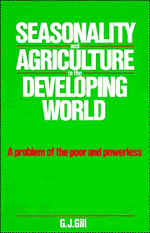Book contents
- Frontmatter
- Contents
- List of illustrations
- List of tables
- Preface
- Acknowledgements
- 1 Introduction
- 2 The sources of seasonality
- 3 Seasonality and the disadvantaged
- 4 Seasonality and the environment
- 5 Coping with seasonality
- 6 Seasonal labour migration
- 7 Special problems of developing countries: I: Market failure and market distortions
- 8 Special problems of developing countries: II. Technological change in a changing environment
- 9 Implications for policy and planning
- Appendix: Seasonal labour migration at the national level: An approach to rapid appraisal
- Notes
- References and sources
- Index
7 - Special problems of developing countries: I: Market failure and market distortions
Published online by Cambridge University Press: 20 May 2010
- Frontmatter
- Contents
- List of illustrations
- List of tables
- Preface
- Acknowledgements
- 1 Introduction
- 2 The sources of seasonality
- 3 Seasonality and the disadvantaged
- 4 Seasonality and the environment
- 5 Coping with seasonality
- 6 Seasonal labour migration
- 7 Special problems of developing countries: I: Market failure and market distortions
- 8 Special problems of developing countries: II. Technological change in a changing environment
- 9 Implications for policy and planning
- Appendix: Seasonal labour migration at the national level: An approach to rapid appraisal
- Notes
- References and sources
- Index
Summary
There are basically two ways in which macro-environmental diversity in agricultural production conditions can be exploited to counter the seasonality problem. One which has already been examined is for workers and the owners of other mobile resources to move them for sale or barter in response to seasonally changing economic opportunity, as happens in seasonal labour migration and nomadic pastoralism. The second, which is complementary to the first, is for owners of agricultural produce to move it around between areas that differ with respect to the timing of seasonal surpluses and deficits. Where such diversity exists, or where it can be created through technological change, the extent to which its counter-seasonal potential can be mobilized depends upon economic integration. It does not necessarily depend upon whether such integration is achieved through central planning or market orientation. The present chapter confines itself to the latter end of the spectrum because few developing economies are centrally planned, while even fewer seem content with the system.
Two observations about the market economy should be made from the outset. First, the use of money, although helpful, is not essential to its development. Much of the seasonal migration/marketing of labour described in the previous chapter is, or was, barter-based: even labour is often in effect bartered, when it is exchanged for a share of the harvest. Although pure barter trade is generally less efficient than trade based on a single and widely acceptable unit of value, the principles as applied to the present discussion are similar.
- Type
- Chapter
- Information
- Seasonality and Agriculture in the Developing WorldA Problem of the Poor and the Powerless, pp. 151 - 172Publisher: Cambridge University PressPrint publication year: 1991



